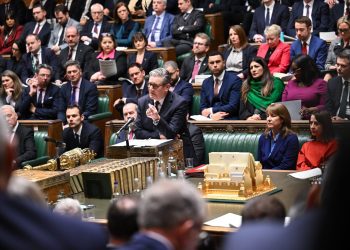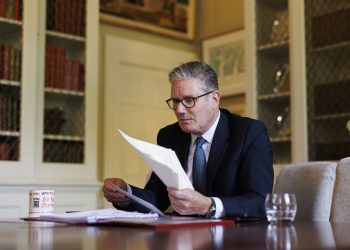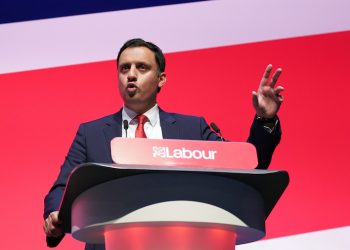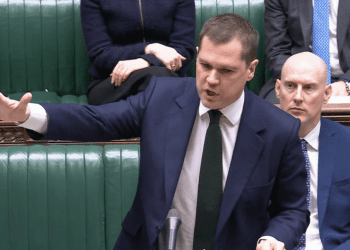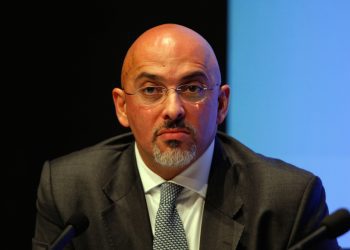A Labour MP has described animal health as “fundamental” to a wider attempt to rebuild trust with rural communities.
Speaking on the Labour conference fringe, Josh Newbury, the MP for Cannock Chase, pointed to animal health and engagement on related issues as areas the government and the farming community “can all agree on”.
He framed action on animal health as a “shared agenda” that could deliver progress on national priorities including biosecurity, food security and economic growth.
Newbury, who serves as chair of the all-party parliamentary group (APPG) on UK food security, said: “The government’s got to grasp [animal health], and actually, I do think… if this is something that we can make positive progress on, that perhaps has stalled in recent years and hasn’t been given the attention it deserves, then I think farmers will start to see that the government has got its finger on the pulse of where the challenges are coming and where we need to go to and that will be very welcome at the moment.”
The comments were delivered to a wide-ranging fringe session, entitled “Injecting confidence: how animal medicines boost biosecurity and UK growth”.
Newbury’s fellow panellists, Dawn Howard and Richard Griffiths, likewise highlighted the role of animal health in underpinning UK food security, national resilience, biosecurity and sustainable economic growth.
Howard, CEO of the National Office of Animal Health (NOAH), emphasised the importance of vaccination and preventative measures in animal health.
She said: “Prevention is always better than cure, and we’ve heard a lot from the current government about growth, the importance of growth in the context of farming, we need to have animals who are well looked after… and access to vets and medicines is a really key part of that.”
She added: “If you don’t have healthy animals, then those farming businesses are not going to be able to survive, and they won’t be there to continue to produce our food going forward.”
Howard went on to refer to feedback delivered to NOAH, the trade association for the UK animal health industry, by its members. The UK’s veterinary medicines regulator has been criticised as “under-resourced”, she said, leading to serious delays in approving new products.
She also pointed to the challenges faced by the veterinary medicines industry in international trade and the need for a comprehensive UK-EU agreement.
Howard commented: “For NOAH and its members, the UK-EU, SPS [Sanitary and Phytosanitary] discussions are very, very welcome, but unfortunately, they do not include veterinary medicines.
“So as the veterinary medicines industry, we fall in a slightly strange place. In many parts of policy, there may be something which has been agreed for human [pharmaceuticals]. And people assume that includes veterinary medicines, or it’s something which may be dealt with at a farming level…but that’s not the case.
“So what we’re calling for is, as part of the discussions which are taking place around the UK-EU SPS agreement, that there is a separate agreement for veterinary medicines…
“We very much welcome what government has been doing, with both ministers and the Veterinary Medicine Directorate [VMD], working together to come up with some measures to tackle supply problems in Northern Ireland post-January 2026, but it feels like there needs to be a longer term solution, and that longer term solution could be delivered through having a UK-EU veterinary medicines agreement.”
The Windsor framework’s grace period for veterinary medicines ends on 31 December 2025, meaning that from 1 January 2026, EU veterinary rules will apply in Northern Ireland.
Newbury, who is a member of the environment, food and rural affairs select committee, responded that the cross-party group needs to “drill into” these points when scrutinising ministers and holding the government to account.
Richard Griffiths, the chief executive of the British Poultry Council (BPC), underlined the importance of animal health and medicines in the poultry industry.
He stated that the UK produces around 20 million chickens a week, which he referred to a “UK success story” – one that in many senses rests on animal health and medicines.
Griffiths said: “Whether you are interested in hunger and food poverty or you’re interested in supply chains, you’re interested in industrial strategy, in health strategy, in welfare strategy – or any of the other numerous strategies that the government is trying to put forward at the moment, and trying to pursue, food is integral to it all, and it can rest sometimes on one or two very specific and specialist areas, like animal health.”
Speaking after the event, Newbury commented: “It was clear from the varied discussion this afternoon that animal health cuts across so many of Labour’s priorities, whether that’s tackling climate change, keeping shelves stocked with affordable food and driving sustainable economic growth.
“This is exactly the kind of conversation we should be having at Labour conference, getting into the detail of how science and innovation can lead to benefits that the public can see and feel.
“Today’s panel showed that innovation in animal health isn’t a niche issue; it’s fundamental to rebuilding trust with rural communities, to food security, and to ensuring the UK produces affordable, sustainable food for generations to come.”
Dawn Howard said: “As we discussed on the panel, our work is about more than just animal health – it’s about public health, food security, and economic resilience. The conversation underlined how prevention-first approaches like vaccination and diagnostics reduce disease, emissions, and costs.
“For me, the takeaway is clear: healthy animals mean a healthier society, and that’s the vision NOAH and our members are working towards every day.”
Richard Griffiths said: “The debate made clear that good animal health isn’t an abstract principle – it’s something that shows up every day in the price and availability of food. From biosecurity to timely access to medicines, these are the foundations of consumer trust and high welfare standards.
“The panel was a valuable chance to show how sectors like poultry are putting that into practice.”
Politics.co.uk is the UK’s leading digital-only political website. Subscribe to our daily newsletter for all the latest news and analysis.
The post Animal health ‘fundamental’ to rebuilding trust with rural communities, says Labour MP appeared first on Politics.co.uk.




















